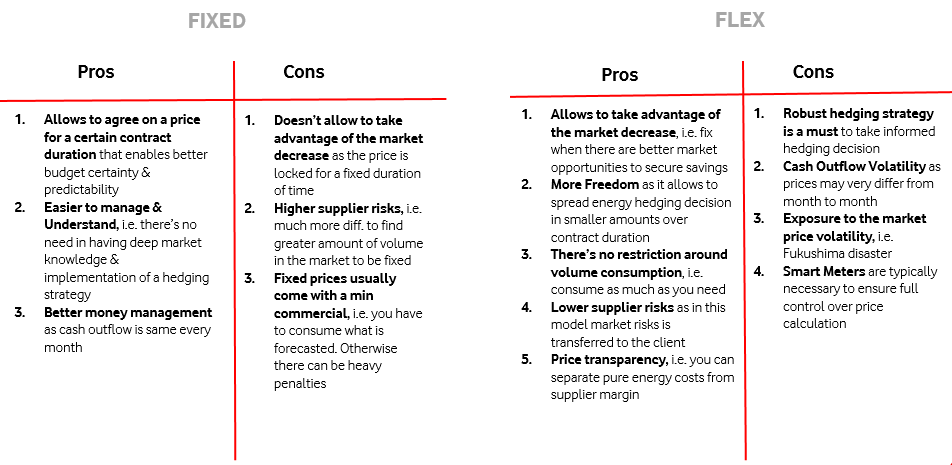Types of Turkish Power Supply Agreements
There are different types of Turkish power supply agreements. It’s important to understand their pros and cons to limit the market price risks and optimize your electricity bill in Turkey. In general, all electricity supply agreements can be grouped into 2 main categories: fixed and flex energy supply contracts.
A fixed electricity supply contract allows agreeing on a fixed price for a certain duration in the future that enables better budget certainty and predictability. This type of agreement will usually last for a duration of 1 to 3 years, depending on market liquidity. In Turkey, however, the length usually doesn’t exceed 12 months because of the high market uncertainties. In simple terms, once a year a customer would negotiate a new supply agreement at a fixed price of electricity for the next 12 months.
Meanwhile, the introduction of flexible energy procurement contracts allows clients to fix, trade, or sell energy in order to spread the risk of energy purchasing. With a flex contract, electricity is bought in several tranches and thus allows clients to take advantage of the market price volatility. However, this type of procurement strategy is typically more work-intensive and requires a deep knowledge of the market in order to make a fixing price decision at the right point in time. Each of the agreements has its pros and cons and depending on your objectives and risk tolerance different procurement strategies can be deployed to address the needs of your company.

Also, it could be that in the low commodity market price environment, a fixed-price energy contract can be very appealing as it would protect an organization against rising costs in the future, especially as we know commodity markets are cyclical. Therefore, a fixed energy contract is more suitable for businesses that are more risk-averse and requires stability and budget certainty over a period of time.
However, in the high market price content, it may not be the most cost-effective solution as you may commit to paying a much higher price in the future than a real market price. Under such market terms, therefore, a flexible procurement can be a better strategy because you don’t “put all your eggs in one basket”.
Another question you need to answer: “Are fixed-term contracts really fixed”? While by its name it may sound like the safest option meaning fixed electricity cost, you need to be aware that there are always other variable components in an electricity bill that can’t be fixed and thus may still impact your budget. Therefore, it’s very important to understand your electricity cost structure to answer this question.
Please visit my next article on Electricity Bill Structure in Turkey, where we discuss this topic.
If you have any questions, please leave your comment below the article. You can also subscribe to my weekly market reports to stay on top of the power market trend.








